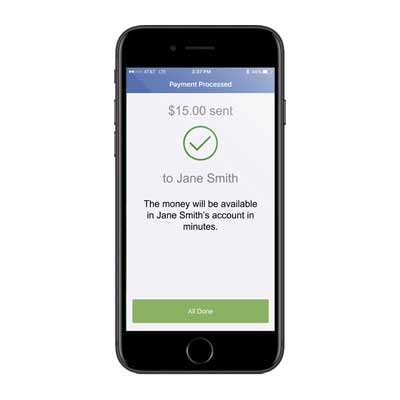As financial institutions look to revamp their payment strategies, peer-to-peer payments are expected to play a key role, says a report from Cornerstone Advisors.
During the past three years, nearly 30% of community-based financial institutions have replaced their P2P service or selected a new one, and about one in five intended to replace their existing P2P payments system in 2022, the report says. In many cases, the P2P service selected was Zelle, according to the report.
“Many banks and credit unions are re-evaluating their P2P services due to consumer demand, as many smaller players in this space are becoming less relevant,” says Sean Loosli, head of consumers and small business payments for Zelle.

Cornerstone surveyed 3,112 consumers in the United States, a sample it says is representative of the U.S. adult population in terms of age, gender, and race. The study was commissioned by Early Warning Systems LLC, operator of the Zelle Network.
To many consumers, P2P payments are table stakes for financial institutions. When asked what action they would take if the financial institution that holds their primary checking account stopped offering P2P payments, 30% of respondents said they would use a checking account with a different financial institution more frequently, 24% said they would close their account, and 23% said they would open an account with another financial institution.
Other actions cited included using the checking account at their primary financial institution less frequently (18%), not recommending the financial institution (17%), lodging a complaint (14%), and doing nothing (23%). Respondents could cite more than one action.
How the institution deploys Zelle is also important, the study showed. “Our research says that consumers will choose a financial institution based on how it uses Zelle, such as the limits it sets for sending money or whether they allow payments to be sent to small and medium businesses,” Loosli says.
P2P payments have become so common that consumers don’t rely solely on their financial institutions to facilitate such transfers. PayPal is the most popular alternative, with 40% of respondents using it to send money to individuals or businesses, followed by Cash App (22%), Venmo (19%), and Zelle (16%). Other payment options listed include Apple Pay (13%), Google Pay (11%), Facebook Pay (7%), and Samsung Pay (3%). Respondents could name more than one service. Venmo is owned by PayPal Holdings Inc.
Sums totaling $250 or less each month were the most common transfers. Consumers that send $100 to $250 per month accounted for 20% of respondents, while 28% send $50 to $100 per month, and 22% send less than $50 per month. Consumers sending $250 to $500 a month accounted for 16% of respondents, while 9% send $500 to $1,000 a month, and 4% send $1,000 to $2,500 per month. Consumers sending $2,500 to $5,000 per month and those sending more than $5,000 per month each totaled 1% of respondents.
When it comes to frequency of sending a P2P payment, 7% say they send daily or almost daily, 25% send weekly, 34% send about once a month, 26% send a few times a year, and 8% never send a P2P payment.
Since March 2020, 56% of P2P payment users said they have sent money using digital-payments tools more frequently than they did before the pandemic, while 16% said they send money less frequently than pre-pandemic.
The most frequently cited reason for why consumers use P2P payments are convenience (61%), followed by speed of payment (51%), a safer way to pay (44%), staying in touch with others (24%), and because it’s a less expensive payment option (17%). Respondents could cite more than one reason.
When it comes to P2P fraud and scams, one in four P2P payments users said they have been a victim of fraud or scams involving digital payments, according to the report. In addition, more than seven in 10 respondents impacted by digital payment fraud or scams said the incident was resolved to their satisfaction by their bank or digital payments provider.





